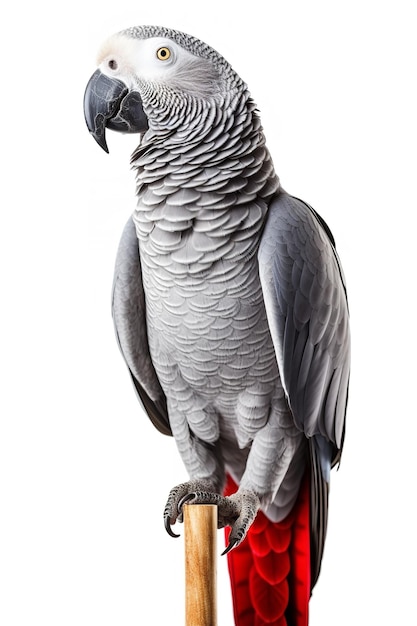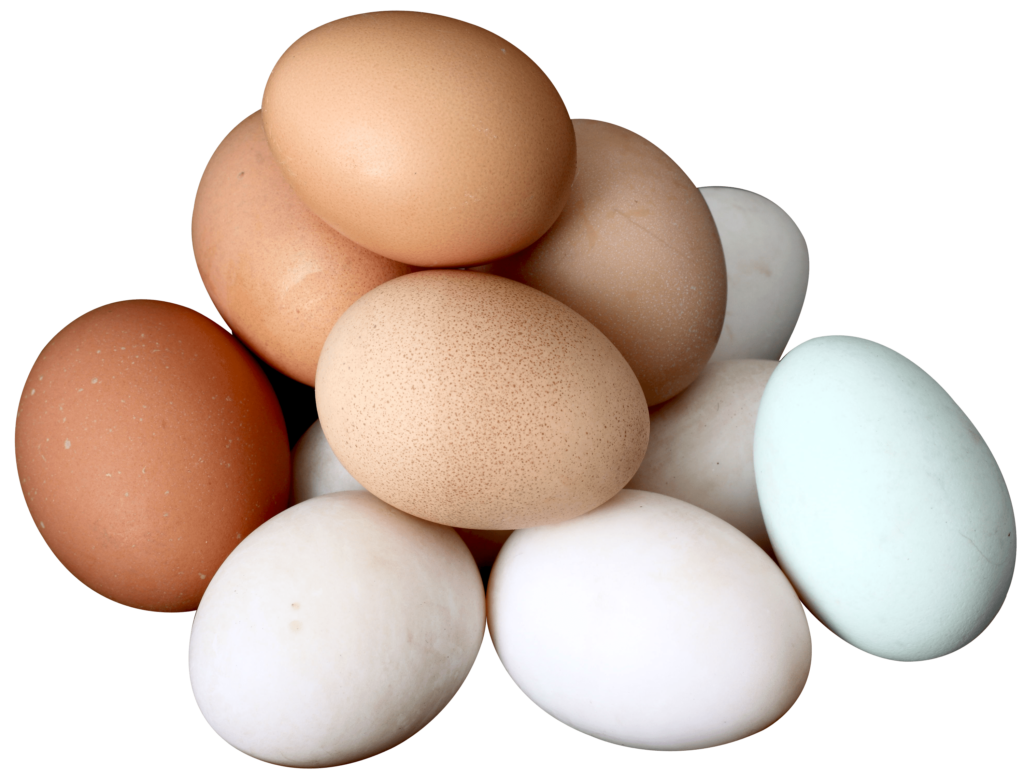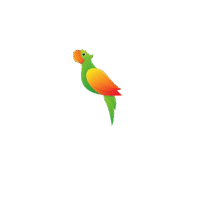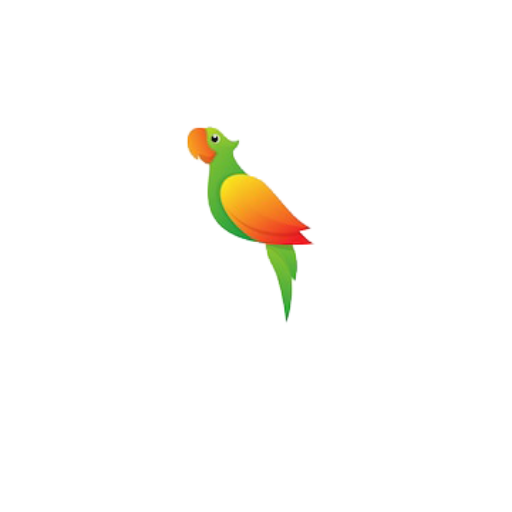

FAQ
The Parrots as a pets Subcategories
Frequently Asked Questions of Purchasing a baby parrot
The arrival home
Is it advisable to add sepiolite (kitty litter) on the floor of the African grey’s cage?
I already have an African Grey Parrot, can I adopt another baby?
Can I bathe my African grey parrot? How do you bathe an African grey
Education and behavior
When will my African grey parrot talk? African grey parrots stand out among other parrot species for their great ability to imitate human voices and other sounds, in addition to their already acknowledged intelligence. This allows them to pronounce simple statements with the right intention. In a way we could almost say that African grey parrots can communicate with us through speech. Vocal imitation, which is a natural behavior for most species of psittacine and other birds, is also a behavior that favors social bonds. In the wild, African grey parrots learn to imitate sounds from nature and other animals, but they also use their own “vocabulary” to communicate among the different members of the group. For a parrot at home, sounds such as the doorbell or telephone, greeting or farewell are the first things it will learn to imitate. A parrot that feels comfortable at home and has the opportunity to participate in family life will be highly motivated to imitate sounds and learn new things, unlike those birds that live without any stimulation. And little by little, spontaneously, it will develop its own vocabulary to communicate with the different members of the family. As a guideline, baby parrots begin to pronounce words before the end of the first year of life.
At what age does an African Grey begin to speak? Most commonly, at 4 months of age, the first attempts at imitating human voices and/or other types of sounds begin. However, vocal imitation depends on several factors such as the individual’s abilities, the stimulation it receives from his family group and its general level of well-being. Some African Greys begin to make attempts to vocalize human sounds as early as 3 months of age. Others do so at around one year of age.
Can a parrot can live with children? It should be natural for our African grey parrot to live friendly with all the members of the family, including the children. However, it is necessary to point out that parrots, like any other pet, are animals that require all our care, attention and respect. We must be clear that animals are not toys and that we cannot acquire one for that purpose. At least initially, every time a child interacts with the parrot, a responsible adult must be present. The level of coexistence between the child and the parrot will be a matter of the child’s own ability to control his movements, as well as the trust that the parrot shows towards him. We should never force the parrot to perform an action, so that it does not feel obliged to defend itself. Growing up with a pet is undoubtedly a wonderful experience that enriches us as people. Respect and love for other living beings is learned at home.
Why does my African Grey screech so often? What can I do to avoid it? Although this anomalous behavior is infrequent in parrots, it is necessary to know how to deal with it correctly, in order to avoid unintentionally encouraging it. If a parrot screeches insistently when it is inside the cage or when the owner is not in sight but the parrot can hear it, it is because it has learned to demand attention through screaming. It is likely that a separation anxiety problem is also involved, i.e. the parrot has hyper-attachment to its owner. What I MUST do:<ul><li>Completely ignore this behavior.</li><li>Reward it when it is calm without screaming.</li><li>Offer quality time and direct contact when it is calm.</li><li>Establish discipline routines and dedicated parrot time.</li></ul>What NOT to do:<ul><li>Respond to it to calm it down or to scold it when he yells.</li><li>Make eye contact while calling for attention.</li><li>Lose patience and stop ignoring it when it is very insistent.</li></ul>KEY POINT: All behavior is a response to a previous stimulus and seeks to generate a consequence in the animal that performs it. That is why the best way to eradicate an unwanted behavior is to ignore it, because if the animal does not get anything for carrying it out, it does not make sense to repeat it.
Nutrition
What solid foods should I feed to my African Grey baby? From the age of 45 days, it is important that the baby has the PF pellets and fresh vegetables (fruit and vegetables) available in separate feeders from very early in the morning. It is important to remove the leftover food late in the day to prevent it from spoiling during the night and being eaten by the baby first thing in the morning.
What should an adult African Grey eat? The diet we recommend is based on our pellets “PF High Energy Formula” or “FP Formula”, supplemented with fresh vegetables (seasonal fruits and vegetables). We consider it important to feed the “Omega Formula” to young African Greys, at least until they reach one year of age. This complete pellets will provide them with all the nutrients their body needs and the fruit and vegetables will bring diversity to the diet, helping to cover their psychological needs (feeding behavior). Occasionally, during training or play sessions, sunflower seeds that we have for sale for this purpose can be used as a reward. Later on, if your parrot is old enough and has the necessary companionship, and you decide to promote breeding, it is important that you start supplying him with the pellets specially designed for this purpose: the “High Energy Breeding”.
Can I share the food I eat with my African Grey parrot? As long as offering it our food an occasional treat, this will not be a problem. However, you have to be careful to avoid excessive protein foods of animal origin (meat, fish, dairy products, eggs…) and foods that are too spicy or too salty. There is no problem if it eats a little bread, pasta, legumes, vegetables, rice… Be moderate. It is important that the parrot does not get used to feed mainly on ingredients other than those it requires to meet its nutritional needs. PSITTACUS High Energy or Omega pellets should constitute the fundamental basis of its diet. Sharing the meal routine as a family is a pleasant and fulfilling practice for both parties, but we consider that it should not be generalized. Preferably, the animal should be fed inside its cage or in another suitable space such as a playpen.
Are there any foods that are harmful to them or that are not advisable to give to the African Grey parrots? There is one that is totally forbidden: avocado. This tropical fruit is extremely toxic for African Grey parrots. Avoid foods too rich in salt, chocolate, coffee, alcohol and raw potatoes. Be careful with ornamental plants you have at home, some of them are toxic.
Is it difficult to hand-feed an African Grey parrot baby? Hand-feeding an African Grey baby is not difficult. Keep in mind that these babies have grown up in our nursery and are used to take the PF hand-feeding formula with the same tools that we will provide you. With each baby we provide the baby food and the syringes with soft tubes to do it. We also give the book “THE ARRIVAL AT HOME – How to receive and take care of the parrot the first day”, that we have written and published, where you will find the answers to all your doubts.
What fruits and vegetables can I give to my African Grey parrot? In general, you can give it all kinds of fresh fruits and vegetables commonly consumed by humans, with the exception of avocado. Limit, however, the quantity of banana. Take advantage of seasonal fruits and vegetables. Diversity in diet is enriching and is an essential part of environmental enrichment strategies.
Can I give my African Grey parrot chocolate, sodas, alcoholic beverages, coffee with milk…? Do not feed it any of these foods, it could be very harmful to it. Often your parrot will want to try the same thing you are eating; whatever it is. If so, you should redirect its interest to other foods that do not represent a risk to its health.

